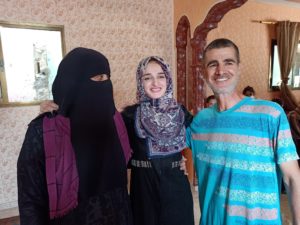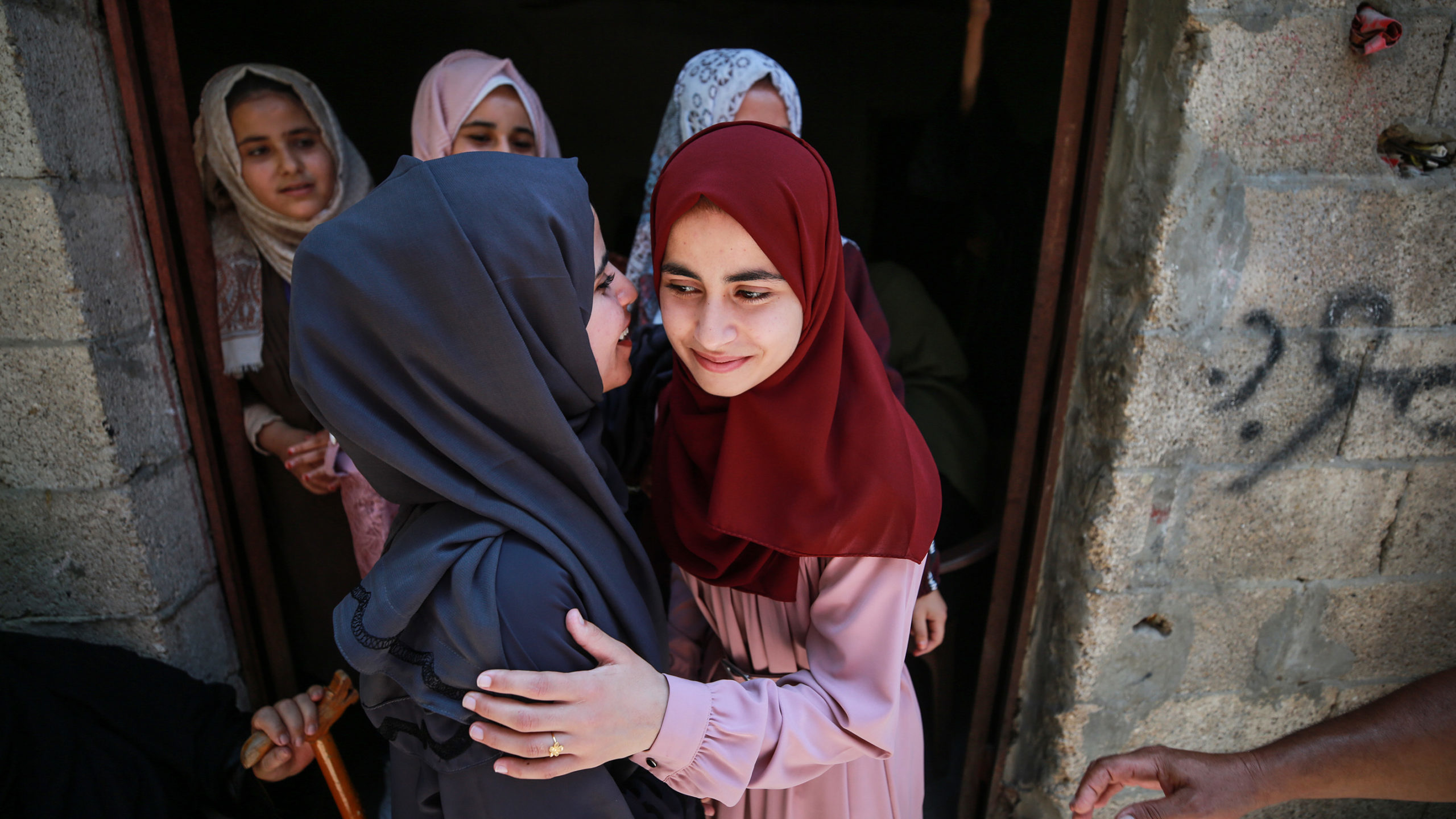Gaza Girls Lead in 2020 Matriculation Test Results
Youngsters in coastal enclave produce outstanding results, yet immense challenges remain
People have been celebrating throughout the Palestinian territories since July 11, when the results of the Tawjehi for 2020, Palestine’s high school matriculation exams, were announced, with a surprisingly high pass rate of 71.3%.
This despite the difficult circumstances due to the pandemic and the strict measures put in place to control the spread of the novel coronavirus.
Amal Hamad, the Palestinian Authority women’s affairs minister, congratulated the students, writing on the ministry’s Facebook page that holding the examinations was “a victory over the harsh and cruel conditions under which our people live due to the Israeli occupation on the one hand, and to the exceptional year, which saw the high school examinations being conducted in the time of the coronavirus, on the other.”
Female students did remarkably well, accounting for 35 of the top 40 results nationally, including 11 young women from Gaza.
As always, the Gaza Strip is unpredictable and a special case in itself.
Despite being besieged by both Israel and Egypt for nearly 14 years, and with all the devastating economic and political consequences, it seems that Gazans do not have the word “impossible” in their dictionary and that Gazan females, in particular, are inspiring successes.
Safaa Sheikh-Eleid, one of the hardworking students in the Tawjehi’s literary stream, earned a mark of 99.4 out of 100, tying for second place at the national level.
With a supportive family of 11 members, she lives in a small, humble house in the southernmost governorate of Rafah, where she devoted most of her time to studying in a tiny space.
“I spent days and nights studying and preparing myself for the exams in a small room that my parents allocated exclusively for me, whereas the rest of the family had to crowd into the hall and keep quiet so that I could focus,” Sheikh-Eleid told The Media Line.
The frequent power outages were the toughest part of the journey.
“I suffered the most from the electricity cuts, which last for at least eight straight hours, which meant I had to intensify my studying during the daytime,” she said.
“At night,” she continued, “I used battery-powered LED lights to see the small print, which was really exhausting, but I’m grateful to my parents, who used to turn off the lights in all the rooms of the house except mine so that the light would be concentrated [and I could read].”
Sheikh-Eleid, who has long dreamed of working in the health professions, had to switch from the Tawjehi’s science stream to the literary stream when she was in 11th grade, due to her family’s difficult finances.
“At that time,” her father told The Media Line, “I couldn’t afford the expensive costs of up to 500 shekels [about $145] for Safaa to study in the science section. I’m a peddler, and I have mouths to feed, but with the high mark she got, she still has a chance to study medicine through a scholarship.”

Safaa Sheikh-Eleid (center) poses with her parents in their home on July 11. (Hassan Esleih)
Sheikh-Eleid herself believes the result was worth the effort.
“The moment when I learned my mark was priceless and very emotional. I forgot all the suffering and was ready to fly and live the dream I thought I had lost.”
Sheikh-Eleid is considering several options for scholarships. Many other brilliant students will not have the same opportunity.
Shaymaa Abulhussein, a prodigy who is also from the Rafah Governorate, is blind. She does not have many options even though she scored 93.3 on the Tawjehi.
“We don’t have high schools for the visually impaired after the 11th grade, so I had to enter a school for the sighted, which was very stressing and difficult,” she told The Media Line.
“While the girls were busy studying on their own, I had to copy their notebooks and then print it in Braille, which took hours and hours,” she noted, explaining that she used a copier in the principal’s office and had her mother read her the notes, which she then copied on an old Braille typewriter.
Abulhussein says that that blind student in the Strip are limited to choosing either the literary stream or the Shariah (religious studies) stream, and end up in schools that are mostly not adapted to their special needs.
The moment when I learned my mark was priceless and very emotional. I forgot all the suffering and was ready to fly and live the dream I thought I had lost
Many challenges have resulted from that harsh reality.
“In college, I won’t be able to enter the health field, engineering or any scientific specialization, because there are no such paths for the visually disabled,” she said.
Abulhussein’s mother told The Media Line that transportation had been a heavy burden on the family. “The school is far from our area and I had to go with her and pick her up back again from school, which was very costly and exhausting.”
The narrative of frustration was interrupted by Shaymaa’s cheerful voice saying, “It’s OK; I’ll be a teacher!”
Shams Abuamra, from the southern governorate of Khan Younis, is another outstanding student, having scored 99.3 in the exam’s science stream. Her resounding success brought happiness and honor to her family and the larger community.
She said that “hard work and time management” enabled her to achieve her goal despite living in extreme poverty, deprived of many of the most basic elements of life.
Mainly, it was the conditions at Abuamra’s home that made things difficult.
“With 11 family members in a packed house and with a metal roof over our heads that doesn’t protect us from the heat or from cold, focusing on my studies sometimes seemed impossible,” she said.
“I used to study for 12 hours in the daytime, before it got dark, and borrow study aids from my older neighbors instead of buying them at the bookstore,” Abuamra told The Media Line.

Shams Abuamra expresses her joy to her father in their home on July 11. (Hassan Esleih)
Her father is unable to work due to poor health, so her mother supports the family by selling snacks to local children.
“I work hard to feed my kids whatever it costs. It’s very stressful to feel that things are so unstable but when I heard on the radio about Shams’ marks, I couldn’t hold myself back and we both cried,” the mother continued. “I’m very proud of her and happy that she could do it.”
Abuamra wants to be a neurosurgeon. “Gazans need [professionals in] such fields the most because they can’t travel abroad to receive treatment,” she said.
Although she was offered a full scholarship to study medicine at Al-Ahliyya Amman University in Jordan, her father thanked the school for the opportunity and turned down the scholarship, for reasons he refused to discuss.
Many of these powerful girls still face formidable challenges on the path to their futures that will require much patience and determination, and good decision making to choose majors that are relevant to the needs of the labor market.
The Gaza Strip suffers a skyrocketing rate of unemployment that has reached 45%, according to a preliminary survey conducted by the Palestinian Central Bureau of Statistics in March.
And the Palestinian labor market can accommodate only 20% of the graduates, according to another statistic published by the same institution in 2018.
Ayda Albatniji, a social worker at a government school in Gaza, told The Media Line: “I’m really afraid that these inspiring girls, who may have overcome social and economic barriers or even the corona disease, may not survive the cruel reality and will join the masses of unemployed youth. Still, I encourage them to be strong and to work hard for their futures.”


